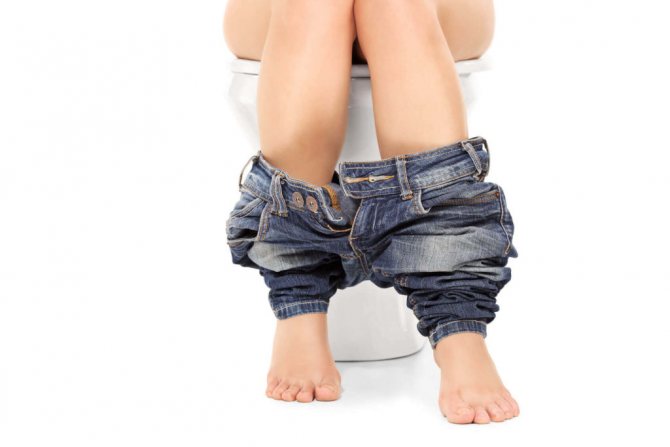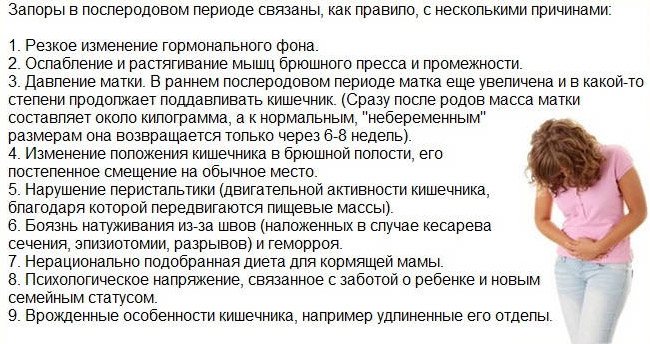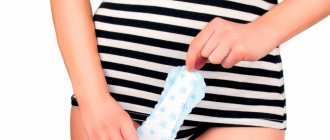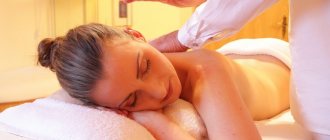In a normal period of life, to solve such a delicate problem, it is common to use quick-acting medications. But constipation after childbirth while breastfeeding is a different story, since it is associated with injuries during the birth of the baby, and taking emergency medications is not recommended. Therefore, it is important to know how to deal with this phenomenon for a nursing mother.
Constipation, including after childbirth, is an unpleasant phenomenon. However, with an integrated approach to the solution and subsequent prevention, you can get rid of it quickly and for a long time.
Symptoms of the disease
It is quite difficult to recognize constipation in the early stages, because the process always occurs differently. But the main symptoms include:
- constant lack of desire for food;
- the intestines are constantly full of gases;
- short-term abdominal pain that feels like contractions;
- bloating of the abdominal area;
- feeling of heaviness in the stomach;
- difficulty in bowel movements;
- the feces are quite dense, formed by tubercles;
- lack of positive emotions and good mood;
- decreased performance;
- unstable sleep, disruption of routine;
- sometimes accompanied by muscle pain;
- more frequent headaches;
- unpleasant taste in the mouth.
We can definitely talk about the appearance of constipation after childbirth if several of the listed points occur in a sick woman. In a particularly difficult situation, medical advice and proper treatment are necessary; folk remedies alone will not correct the situation.
Effective exercise
For women who have no contraindications to physical activity, various physical exercises will be very useful. For example, morning exercises performed in the morning before meals. Before it, it is recommended to drink a glass of warm water. It is necessary to perform standard procedures - leg swings, turns, bends.

For women who have contraindications to physical activity, walking is an excellent method. Their duration should be gradually increased. Breathing exercises that complement walks in the fresh air have proven effective.
You also need to ensure regular cleansing of the intestines from feces. This is important for the overall health of the body. Not only physical activity contributes to the normal functioning of the digestive system, but also following a special diet that will help normalize the body’s condition and increase the amount of milk produced by the glands.
Causes of postpartum constipation
The occurrence of the disease after childbirth is sometimes caused by improper behavior during pregnancy, but most often the causes of constipation have a very clear origin:
- Psychological reasons: - a sharp change in lifestyle, fatigue, lack of sleep and increased fatigue due to the appearance of a lot of trouble with the child; - fear of physical pain, especially if there are severe tears after childbirth or injury.
- Physiological reasons, including:
- an enlarged uterus that puts pressure on the intestines or rectum;
- non-compliance with the diet and consumption of solid, dry food;
- changes in muscle tone (stretch or weaken during childbirth);
- the influence of hormones, the production of which is under considerable stress after childbirth;
- constipation after cesarean section while breastfeeding.

The causes of constipation are varied: from psychoemotional to physiological. All of them can and must be fought.
Specifics of constipation
Constipation is a process in which there is no bowel movement for three or more days, or it is accompanied by difficulty and pain due to too dry, hard stool. The reasons, as we have already found out, are psychological and physiological. Therefore, constipation is divided into two types:
- Anatomical constipation in a nursing mother occurs after a cesarean section or other surgical intervention. In addition, poor nutrition can also be a cause. This type characterizes a decrease in muscle tone of the intestinal walls.
- Spastic constipation during breastfeeding occurs due to severe stress, depression or anxiety. In this case, first of all, it is necessary to restore mental balance and calm down. How to overcome depression after childbirth can be found here.
Most often, constipation does not require special treatment and goes away within two to three weeks after birth. If the illness does not go away for a long time, do not rush to treat constipation with medications. Not every drug is compatible with lactation. Many suppositories are generally contraindicated during breastfeeding.
Often the composition of the drug penetrates into the blood and milk, which negatively affects the course of lactation. The medicine can change the quality of milk and negatively affect the development and growth of the baby.

What are the dangers of constipation while breastfeeding?
It would seem that such a harmless disease as constipation during lactation can sometimes take different forms. In addition to inconvenience, it can cause:
- Unpleasant sensations in the stomach - heaviness, bloating, pain in the lower abdomen.
- Decreased appetite, excessive fatigue and deterioration in performance.
- Headache, sleep disturbance.
- Characteristic odor from the mouth.
- Skin problems, excessive irritability and anxiety.
Such negative consequences can affect milk production, and sometimes lead to its complete cessation.
Traditional methods of treating postpartum constipation
For the treatment of intestinal disorders during breastfeeding, an infusion of gooseberries is popular. A tablespoon of berries is poured into 200 ml of water and simmered over low heat for about 10 minutes. The resulting decoction is divided into 4 equal parts and drunk throughout the day.
It is useful to add cherries or pieces of dried apples to tea.
Drinking 50 ml of freshly prepared potato juice half and half with water 30 minutes before meals will relieve spastic constipation.

Fennel, cumin and anise have shown themselves to be effective in the treatment of atonic constipation during lactation. The mixture of these plants is poured with boiling water and left for 20 minutes. Drink three times a day, half an hour before meals, no more than 60-70 ml at a time.
It is not recommended to drink decoctions or use medications containing senna after childbirth. This plant increases the tone of intestinal smooth muscles, which is contraindicated in spastic constipation. Taking senna during lactation can cause digestive disorders in the baby.
A nursing mother should not take any laxatives, both natural and medicinal, systematically - this will lead to addiction and cause chronic constipation syndrome.
Exercises for constipation
Therapeutic exercise helps eliminate constipation in a mother who has recently given birth by normalizing the motor activity of the entire gastrointestinal tract. If the physical condition of the nursing mother allows, there was a natural birth without complex deep tears, then it is permissible to gradually begin to do some simple exercises designed to help fight constipation.
For spastic type of constipation, exercises should be performed in a calm rhythm: their goal is to relax the smooth muscles of the intestines. Simultaneous bending of the legs at the knee joints is useful, the first cycle is in a position lying on your back, the second - lying on your stomach. In the same position, you need to alternately bend your knees in the direction opposite to your body.
With atonic constipation, a nursing mother should exercise at an active or moderate pace. This could be general strength training. Treatment of this type of constipation with exercises to strengthen the abdominal muscles is very effective.
Prevention of constipation and general recommendations
Long walks in the fresh air, a varied diet and an active lifestyle will serve not only as the best prevention of constipation during breastfeeding, but also as an effective aid in its treatment.
Swimming in a pond or pool perfectly stimulates the entire digestive tract, thereby preventing or helping to eliminate problems with bowel movements.

The position of the mother while breastfeeding is of great importance: you cannot stay in the same position for a long time, change your position as often as possible.
If treatment for irregular bowel movements at home does not produce positive results, you should immediately consult a doctor.
Treatment of constipation
Self-treatment of constipation during breastfeeding is often successful; sometimes it is enough to just slightly adjust your current lifestyle. It is important for a nursing woman to avoid conflict situations, try not to succumb to stress and unnecessary worries. A good emotional state not only affects lactation, but also helps to cope with bowel problems. For the same purpose, lactation consultants advise walking as much as possible and spending time in the fresh air. In addition, do not forget about the quality of nutrition, fluid intake, and moderate physical activity.
Causes of constipation during lactation
The main reason for the appearance of severe constipation during lactation is an enlargement of the woman’s pelvic organs, severe displacement of the intestines and other digestive organs. This factor affects the body not only of a pregnant woman, but also of a nursing mother. The location of the organs is not immediately restored, which becomes the reason for the weakening of peristalsis. Also, this condition is provoked by:
- the body's production of progesterone;
- lack of fiber;
- lack of physical activity;
- the presence of inflammatory processes;
- hemorrhoidal nodules, which inhibit the urge to defecate and provoke discomfort during the process;
- taking iron-containing medications;
- metabolic disorder;
- taking medications with side effects such as digestive disorders;
- endocrine disorders.
Constipation in a mother while breastfeeding can not only cause discomfort, but also cause severe harm to the body.
Diet for constipation in nursing mothers
By changing your diet and adding the right foods to your meals, you can avoid recurrent constipation and eliminate the disease that has already appeared. Don't eat fried, salty or spicy foods. Nutritionists do not allow eating sweets and flour products without limit. It is also not recommended to add spices, seasonings and more salt to dishes. These product categories will only make the problem worse.

A balanced diet and drinking regime are important components of the fight against constipation and its prevention.
It is useful to eat stewed, boiled or baked dishes. And raw vegetables and fruits should be eaten in small portions, since in addition to health problems for the mother, these difficult-to-digest ingredients are harmful to the baby. And in addition to constipation, the mother can cause an allergic reaction or colic in the newborn. A nursing woman's diet should contain fermented milk ingredients that will help establish the body's microflora. And dried fruits or vegetable oils (especially olive and flaxseed), consumed as food, act as a natural laxative against constipation.
Diet of a nursing mother for constipation
To eliminate constipation in a nursing mother, it is enough to adjust the diet. A proper diet is the key to successful lactation and the well-being of mother and baby. Avoid highly fried, salty and spicy foods. Eliminate carbonated drinks from the menu, and consume sweets and starchy foods in limited quantities. Salt and other spices greatly irritate the intestines, which further worsens the condition.
Always eat vegetables and fruits stewed, boiled or baked. The raw product takes longer to digest and makes bowel movements more difficult. In addition, they negatively affect the still fragile body of the newborn. Allergies, poisoning or colic may occur in the infant. Therefore, introduce new foods into your diet carefully.
Foods and drinks for constipation
| Benefit | Harm |
| Dried fruits (figs, prunes, dried apricots) | Astringent fruits and berries (persimmon, blueberries, black currants, etc.) |
| Fermented milk products (kefir and low-fat cottage cheese, yogurt without additives) | Milk, black tea, milk tea, coffee beans |
| Flaxseed and olive oil can be drunk directly on an empty stomach, one tablespoon 1-2 times a day | Pasta, mashed potatoes and boiled eggs |
| Boiled beets and carrots, as well as carrot and beet puree | Eggplants, sour apples, green firm pears |
| Natural juices from fruits and vegetables | Grape and mint juice |
| Porridge from gray and brown cereals (rolled oats, millet, oatmeal) | White porridges (semolina and rice) |
| Fatty salted fish, but in limited quantities. You can pre-soak the fish in water to remove excess salt. | Pure meat and strong meat broths. Stew meat with vegetables or add to puree |
| Herbal decoctions of fennel, cumin and anise | Baked goods and sweets (bread, cookies, crackers, chocolate) |
Tips from the article “Nutrition after childbirth” will help you create the right diet for breastfeeding. If you have constipation, follow a drinking regime and drink at least two liters a day. One glass of drinking water in the morning on an empty stomach stimulates the intestines.
Constipation in a nursing mother can be easily treated with a little physical activity. Do exercises, walk, go to the pool. Yoga is safe to practice while breastfeeding.

Medicinal treatments
It is better to use medications only when alternative treatments no longer help. In this case, you should use only those products prescribed by the doctor. After all, if used incorrectly, active particles of medicinal substances can reach the child.
Laxatives
During lactation, there are several approved drugs in different release forms. A separate category includes bulk products for their dilution and syrups.
In any case, the medications used should exclude the use of senna. This plant has an irritating effect on the mother’s gastrointestinal tract, and if ingested by a baby, it can cause spasms, pain, or bowel disorders in the newborn.
The following syrups are allowed during lactation: Duphalac, Lactulose, Normaze. These liquids are based on the same component - lactulose - but not immediately, but after two or three days. Flatulence is noted as contraindications; at the beginning of taking the drug, gas formation may increase.
Candles for constipation
They are also used in several variations. It is recommended to use sea buckthorn and glycerin suppositories for constipation after childbirth, as well as Evacue. The peculiarity of glycerin preparations is that feces under the influence of the medication are softened and almost painlessly released from the body. The other side of the coin when introducing such suppositories is considered to be the existing contraindications - suppositories are not allowed for hemorrhoids, damage to the anus, which often occurs in primiparous women. If there are wounds and minor cracks, then it is better to use preparations with sea buckthorn extract, which, in addition to a laxative effect, have an anti-inflammatory effect.
Enemas
Approved for both mother and child use. Microlax microclysters are almost harmless, convenient to use, and also have a safe composition.

There are a large number of remedies (suppositories, syrups, enemas) for constipation that are effective and safe during breastfeeding.
Constipation immediately after childbirth: what to do
In the first days after childbirth, when the stitches have not yet healed, even the normal process of defecation can be painful and difficult, as it hurts the mother to push. For constipation after childbirth, it is permissible to use some laxatives that will help alleviate the mother’s condition. Especially often, a mother is worried about constipation after a cesarean section, since the muscles of the abdomen and pelvis are weakened and damaged.
Conventional remedies for constipation cannot be used at this time, so you should definitely consult a doctor for a prescription. He will prescribe the necessary medications, as a rule, these are Duphalac, Fortrans, microenemas or glycerin suppositories for constipation; after childbirth they are effective and quite safe.
However, these funds are still recommended to be used only as an emergency measure and for a short time. Once in a baby's body, laxatives can cause diarrhea and bloating. Therefore, in the future, constipation after childbirth during breastfeeding must be treated in other ways.
Folk remedies for constipation in nursing mothers
Traditional medicine recipes, although known for a long time, should also be recommended for use during lactation by the attending physician. You need to know exactly whether they will be useful in each case separately. To help with constipation after childbirth:
- Prunes. Dried fruit from the infusion (5 medium-sized pieces per glass of water) is eaten every day, and it is recommended to drink the infusion on an empty stomach.
- Figs Consume after pre-soaking overnight, similar to prunes.
- Herbal mixture of anise, dill and fennel. Infusion of 2 tbsp. spoons of the collection and boiling water are drunk half an hour before meals up to three times a day.
- Decoction of licorice roots. 1 tbsp. spoon of crushed plant per glass of boiling water. Strain and take the tincture before meals (30 minutes before) three times a day.
- Chamomile tea. An alternative to black tea for constipation.
- Bran. Store-bought granules are added to porridge, milk or drink and consumed on a daily basis before bed.
Folk remedies
Only a doctor can tell you how to get rid of constipation using folk remedies. This is explained by the fact that many of the substances included in their composition can penetrate into the milk and affect the baby.
Laxatives offered by traditional medicine include the use of certain foods and herbal infusions.
Herbal infusions
You can get rid of constipation during lactation with the help of herbal decoctions. The following decoctions are commonly used:
- From the fruits of anise, caraway and dill. To prepare such a decoction, you need to take one teaspoon of the seeds of each plant, place it in a thermos, pour 500 ml of boiling water and leave overnight. Take a tablespoon before meals.
- From prunes. To make it, you need to take several fruits, add boiled water and let it brew for a while. You should drink the infusion before meals.
- From figs. To make an infusion, you need to pour 50 g of figs with a glass of boiled water and let it brew. Drink a tablespoon three times a day. You can use milk instead of water.
- From gooseberries. A few berries (a tablespoon) should be poured into a glass of water and boiled for 10 minutes. The resulting broth should be filtered and cooled. Drink a quarter glass four times a day.
- From dill seeds. To obtain an infusion, pour 10 g of dill seeds with boiling water, leave for a while and strain. Drink before meals several times a day.
- From cumin, fennel and anise. To make a decoction, you need to take two tablespoons of each plant and pour boiling water over it. The resulting decoction should be drunk 30 minutes before meals three times a day, a third of a glass.
Mothers need to remember that even safe decoctions should be drunk with caution. Some of them can cause an allergic reaction in the baby. Therefore, initially you only need to take a sip of the decoction, after which you need to monitor the child for a day. If everything goes well, you can drink the drink.
Products that have a laxative effect
Both medications and consumption of the following foods can help a mother cure constipation:
- Prunes. Decoctions and infusions are made from it, and they are also added to salads and the pulp is eaten steamed.
- Dried apples. You can make a decoction from them.
- Pumpkins. Pumpkin can be eaten baked and stewed; juice is made from the raw vegetable.
- Carrots. The vegetable is consumed raw or boiled.
- Beetroot. It is usually put boiled in salads.
Folk remedies for spastic constipation
Since spastic constipation is based on nervous experiences, first of all, the mother needs to improve the functioning of the nervous system. The following decoctions can help with this:
- From cumin, fennel and anise. To prepare it, you need to take two tablespoons of each plant and pour a glass of boiling water. You should drink the decoction one-third of a glass half an hour before meals three times a day.
- From anise fruits, chamomile flowers, dried strawberry and nettle leaves, crushed valerian roots. All components are mixed in equal proportions. Then you need to pour two tablespoons of the mixture into 500 ml of boiling water and leave in a thermos for 8 hours or more. You should drink the decoction one tablespoon before meals.
An unbalanced diet can also cause spastic constipation, so a nursing mother needs to adhere to a certain diet.
Folk remedies for atonic constipation
The cause of atonic constipation can be any surgical intervention, for example, a cesarean section, so to combat it, you need to strengthen and develop the intestinal and abdominal muscles through a number of exercises. You should also eat the right foods. Using herbal decoctions prepared according to the recipes mentioned above can also help.

Exercise for constipation
In addition to daily walks with a stroller in the fresh air, if constipation occurs, nursing women should do simple gymnastic exercises. While still in the maternity hospital, you can perform exercises while lying on the bed - using inhalation, hold your breath and inflate your stomach, and while exhaling through your mouth, draw in your stomach. Do five approaches daily. Then, every day you can gradually increase the load by adding abdominal exercises. This will not only bring positive emotions into your mother’s life, but will also strengthen muscles and help cope with constipation.
Exercises for constipation
Physical education helps a nursing mother cope with constipation. Immediately after the birth of the baby, a woman should start doing exercises in the morning, and the exercises must be done on an empty stomach, after drinking a glass of warm water.
It should be noted that a young mother does not need to strain herself; it is enough to spend 5-10 minutes on gymnastics every day, and the set of exercises is best performed several times a day.
Immediately after childbirth, it is recommended to perform the following exercise:
Lie on your back, keep your arms loose along your body, legs slightly bent. Take a deep breath, inflating your stomach and holding your breath for a while. Then exhale forcefully through your mouth, while trying to draw in your stomach as much as possible. Perform 5 or more times.
Three days after the baby is born, the following exercises are added:
- Take the same starting position as described above, pressing your knees together. Take a normal breath and at the same time strongly strain the pelvic floor muscles (as is done to prevent bowel movements). Then hold your breath a little, then exhale and relax. Do it several times.
- Take a similar starting position. Inhale, raising your left arm and right leg at the same time, then exhale and lower. Perform the same sequence with the left leg and right arm. Do the exercise 5 times.
- Stand up, arms extended forward, feet shoulder-width apart. As you inhale, turn your torso to the right, while moving your right arm as far back as possible (do not lift your legs off the floor). Return to the starting position and exhale. Then do the same exercise to the left. Repeat several times.
Four days after birth, you can add these exercises:
- Stand up, arms extended forward, feet shoulder-width apart. Clasp your fingers in a lock in front of you. Perform a turn, while trying to move your arms back as far as possible. Do it several times.
- Lie on your back with your arms extended freely along your body. Bend your knees. Inhale and at the same time raise your pelvis, holding it in this position for several seconds. Then exhale and lower yourself. Run several times.
- Get on all fours. Inhale, drawing in the perineum and stomach. Hold your breath for a few seconds, then exhale and lower yourself. Do it several times.
14 days after birth, it is recommended to supplement the complex with the following exercises:
- Stand with your hands raised to your shoulders and your elbows forward. Bend your right leg at the knee, lift it and try to touch your left elbow with your knee. Do the same with the other leg. Do it several times.
- Lie on your back with your arms extended freely along your body. Bend your knees and spread them slightly apart. Inhale and at the same time raise your pelvis, while straining the muscles of the perineum. Hold it in this position for several seconds. Then exhale and lower yourself. Run several times.
- Lie on your back and take turns pressing your bent leg to your stomach.
This complex can be performed on mothers who have not had severe ruptures or cesarean sections. Otherwise, you should consult a doctor before exercising.
Women suffering from atonic constipation can additionally in the morning (before getting up) vigorously rub the skin near the navel and towards the groin with the fingers of both hands. In this case, your legs should be slightly bent at the knees. This massage lasts about 4-5 minutes.
If mommy has spastic constipation, she will be helped by gentle stroking of the entire tummy with a slight pressure (they should be performed in a clockwise direction).
If mom is still weak, she can take walks, gradually increasing their duration. Yoga classes are allowed during lactation.
In addition to walking and exercise, you can perform a set of breathing exercises.
General recommendations and prevention
To prevent constipation during breastfeeding, a mother needs to follow a number of simple recommendations:
- Drink plenty of fluids. And not only as a prevention, but also in treatment. After all, when using medications, the water balance in the body is also disturbed.
- Stick to proper nutrition. Include fiber-rich vegetables and fruits in your diet. At first it is better not to eat them raw, and then start trying them with caution.
- Consume fermented milk products, but do not eat or drink low-fat foods.
- Move and expose the body to moderate physical activity.
- Keep calm, avoid stressful situations and depression.
If a nursing mother cannot cope with the treatment of constipation on her own, then she should consult a doctor. Since untimely treatment or its absence will lead to intoxication of the body, which can harm the baby, which no caring and loving mother should allow.
How to deal with the problem?
Treatment for the mother is based on the diet that most effectively helps get rid of the problem. As mentioned earlier, you can eliminate the disease by knowing the cause. Based on this, several ways to cure constipation are proposed:
See also: Treatment of constipation in the elderly with traditional methods
1. During lactation, it is very important to eat foods containing large amounts of fiber, which will help fight the disease. This applies to fruits and vegetables - carrots, pumpkin, beets, apricots, watermelon and plums. Naturally, it is necessary to observe the measure. When introducing a new product into the diet, carefully watch the child’s reaction. Oat porridge, bran bread, dried fruit, sunflower oil and kiwi are also considered excellent laxatives after childbirth.
2. Physical activity is of no small importance in treatment. Regular walks and exercise throughout the day are recommended. This will improve intestinal activity by breaking up stool. At the same time, be sure to drink plenty of fluids.
3. An excellent way to get rid of constipation is to use rectal suppositories. Glycerin suppositories, which are effective in the presence of ruptures, will help with this. Contraindications apply only to those who suffer from hemorrhoids, fissures and tumors in the rectum. But before purchasing medications for treatment, be sure to consult a doctor.

If there are stitches on the perineum or cervix, the young mother must undergo a cleansing enema before being discharged from the hospital. In the future, act individually.
If constipation does not go away for a long time, in order to eliminate it, it is recommended to start consuming bran in its pure form or products containing it, for example, Eubicor. For treatment, it is enough to take it 3 times throughout the day. To get rid of constipation, a nursing mother should not drink laxatives, which are used by everyone. The result of such treatment of the problem will be abdominal pain with diarrhea in the baby.
Approved drugs
To eliminate constipation in mothers during lactation, many medications have been created:
1. It is recommended to cure problematic stools with drugs based on lactulose. The digestive system does not digest or absorb it. The main effect is acidification and softening of the intestinal contents, populating the organ with lacto- and bifidobacteria. These products include Duphalac, Lactulose Poly, Portalac, Normaze and Romphalac. Once in the large intestine, they have a laxative effect without affecting peristalsis. The amount of feces increases, causing its natural waste.
2. To treat constipation during lactation, there are several other laxatives - Fortrans and Forlax, Forteza RomPharm and Transiner. They are created on the basis of macrogol and are available in the form of a powder for diluting a suspension. The molecules of the substance have a linear shape that can absorb water. In the body, it does not change its appearance, reaching the problematic organ, providing a laxative osmotic effect.

3. Another approved means for treating young mothers are senna, represented by Senade, Sennalax, Regulax and Glaxenna. Indian or Alexandrian senna is a shrubby plant. Although domestic experts do not recommend these drugs to young mothers due to their allegedly irritating effects on the intestines, including the child’s organ. But according to the International Directory, these data have not been confirmed. The plant has a mild laxative effect without being absorbed into the intestines. This allows young mothers to treat constipation during lactation without fear of harming the baby.
See also: Laxatives for constipation in older people
It is necessary to combat constipation wisely, without taking laxatives on a regular basis. After some time, the effect of treatment decreases, forcing you to increase the dose. According to doctors, laxatives are only an emergency aid, but not a solution to the problem as a whole.











